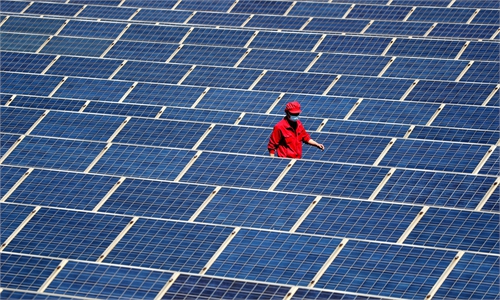
Illustration: Tang Tengfei/GT
Multilateral cooperation is needed more than ever to accelerate efforts toward the green transition. Mitigating the risks of geo-economic fragmentation and strengthening rules-based multilateral frameworks are essential to ensure that all economies can reap the benefits of future growth, according to the World Economic Outlook for October 2024, published by the IMF on Tuesday.The green transition has become a global consensus, embodying significant opportunities for economic and industrial chain cooperation worldwide. China has made substantial progress in the green industry sector. Unfortunately, some Western countries are not cooperating with China in the green industry; instead, they are opting to suppress and contain its green efforts.
This kind of suppression not only undermines the joint development of the global green industry but may also hinder efforts to address climate change worldwide. In the process of the global green transition, countries need to shun zero-sum thinking and promote the development of the green industry with an open, inclusive and cooperative attitude.
In recent years, Western countries, particularly the US, have intensively promoted the narrative of "overcapacity" in relation to China's green products. This effort aims to depict China's green industry exports as "threats" to the global market, creating an excuse for imposing excessive protectionist tariffs on these products.
Such utterly groundless accusations reflect the double standards of certain Western countries in the realm of the green economy. On the one hand, they advocate for the green transition while attempting to shift the blame for climate change onto China and other developing nations. On the other hand, they impose unreasonably high tariffs on China's photovoltaic products, electric vehicles (EVs) and other new-energy products, seeking to protect their own markets through trade barriers.
This practice not only compromises the fairness of international trade but also obstructs global cooperation in the green industry, ultimately jeopardizing efforts to combat climate change. It denies developing countries their rights and aspirations to cultivate green industries, which is undeniably selfish.
On September 27, the US government hiked the tariff rate on Chinese EVs to 100 percent and significantly raised tariffs on other new-energy Chinese goods, such as solar products. The hefty US tariffs on EVs and other new-energy products from China aim to weaken the competitiveness of Chinese imports, which have strong product quality and price advantages. Meanwhile, the US has significantly increased support and subsidies for related industries to bolster domestic companies.
Additionally, in recent years, the US has been advancing a strategy of "decoupling" from China to maintain its dominant position. In response to the competitive edge of China in the global market, US policymakers have implemented measures to exclude Chinese industries from global industrial chain cooperation.
But such actions not only fail to hinder China's green transition but may also backfire on their own industries, dragging down the global economic recovery and the green transition. This trade protectionism is a form of artificial intervention and fragmentation of the global market, which will inevitably disrupt the supply chain of new-energy products worldwide.
Despite the protectionist and "decoupling" approaches of some Western countries, China will not change its stance to engage in extensive cooperation with all countries in the field of green industry to jointly advance the process of the global green transition.
Some Western countries bear historical responsibility in the climate change issue. If these countries can stop hyping the "threat" narrative and cease suppressing China's right to develop its green industry, there will be a possibility for deeper cooperation across the world in this field.
As the two largest economies in the world, China and the US have more opportunities for cooperation and potential for the development of the new-energy industry. If the two countries can work together, it will accelerate the transformation of the new-energy industry and enable countries around the world to better respond to climate change.
The author is a reporter with the Global Times. bizopinion@globaltimes.com.cn



